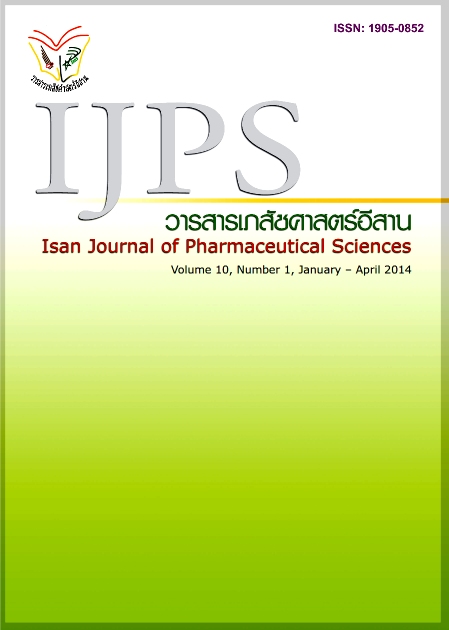Screening questionnaire to identify children at risk for asthma or decreased lung function
Main Article Content
Abstract
Introduction: Asthma is an important chronic disease that prevalence is increasing worldwide. In Thailand, the prevalence of asthma among children increased by over 1.8 million. To screen young asthmatic patient currently, questionnaire for asthma screening is not used in Thailand. The objective of the study was to develop the questionnaire to identify children who have risk for asthma or decreased lung function. Materials and Method: The study design was cross-sectional study in children aged 7 to 12 years, enrolled from the municipal school , Muang district, Sisaket province. The subjects were divided into 2 groups according to lung function, peak expiratory flow rate (PEFR) ≥80% of 606 subjects (77.49%) and PEFR<80% of 176 subjects (22.51%). All participants completed the data collecting form consisting of risk factors and symptoms of asthma. A multiple logistic regression was used to measure the associations betweenPEFR ≥80% or <80% as the dependent variable and risk factors and symptoms of asthma as the independent variables. Results: The questionnaire contains the following items, age, cough, wheezing and chest tightness. The value 9 was selected as the cut point for subject with increased risk of PEFR <80%. The questionnaire has sensitivity 57.95%, specificity 63.86%, accuracy 62.53%, positive predictive value 31.78%, negative predictive value 83.95% and area under the receiver-operating characteristic curve 62.88%. Conclusion: This questionnaire is simple tool to properly identify the children at increase risk for asthma or decrease lung function. It is inexpensive and efficacy.
Article Details
In the case that some parts are used by others The author must Confirm that obtaining permission to use some of the original authors. And must attach evidence That the permission has been included
References
Bianca AC, Wandalsen GF, Miyagi K, Camargo L, Cezarin D, Mallol J, et al. International study of wheezing in infants (EISL): vali¬dation of written questionnaire for children aged below 3 years. J Investig Allergol Clin Immunol 2009;19(1):35-42.
Global initiative for asthma 2009. Guideline for asth¬ma management and prevention (for adult and children older than 5 years) [internet]. [place unknown]: medical communication; 2010 [cited 2010 Jun 15]. Avaiable from: http://www. ginasthma.org
Riemersma R, Postma D, Kerstjens H, Buijssen K, Boezen M, Aalbers R, et al. Development of a questionnaire for the assessment of bronchial hyperresponsiveness. Primary Care Respiratory Journal 2009;18(4):287- 93
Shin B, Cole SL, Park SJ, Ledford DK, Lockey RF. A new symptom-based questionnaire for predicting the presence of asthma. J Inves¬tig Allergol Clin Immunol 2010;20(1):27-34.


